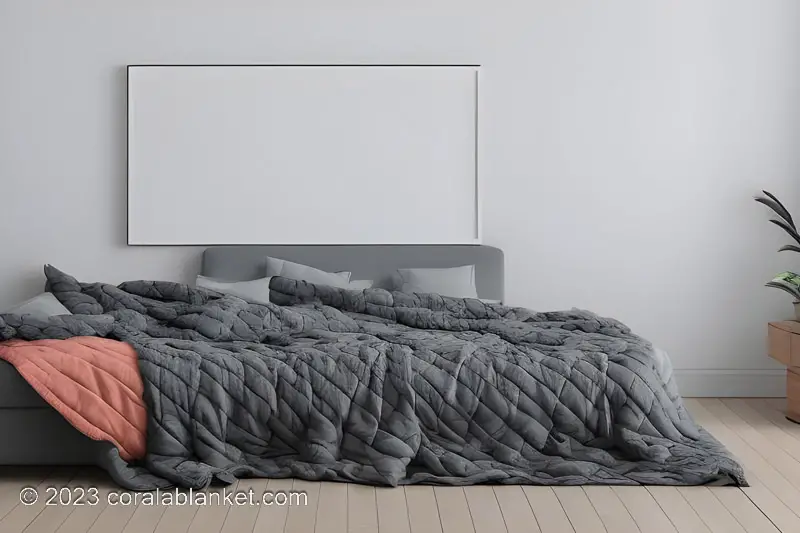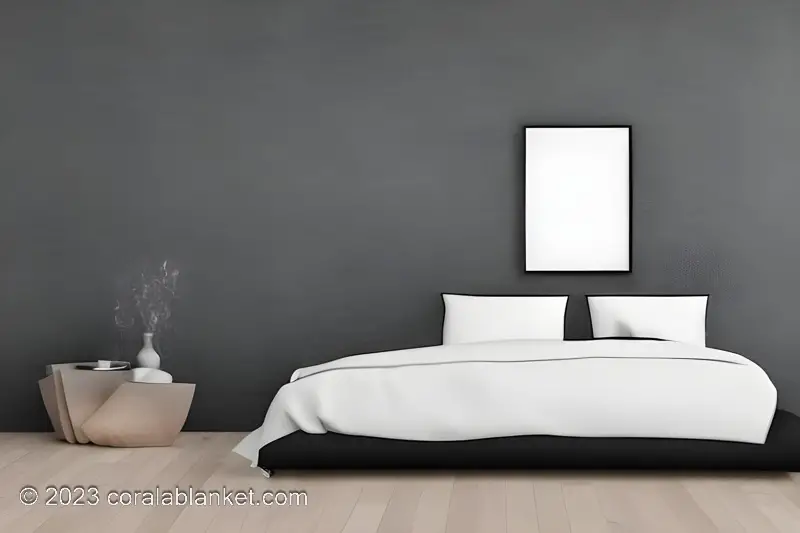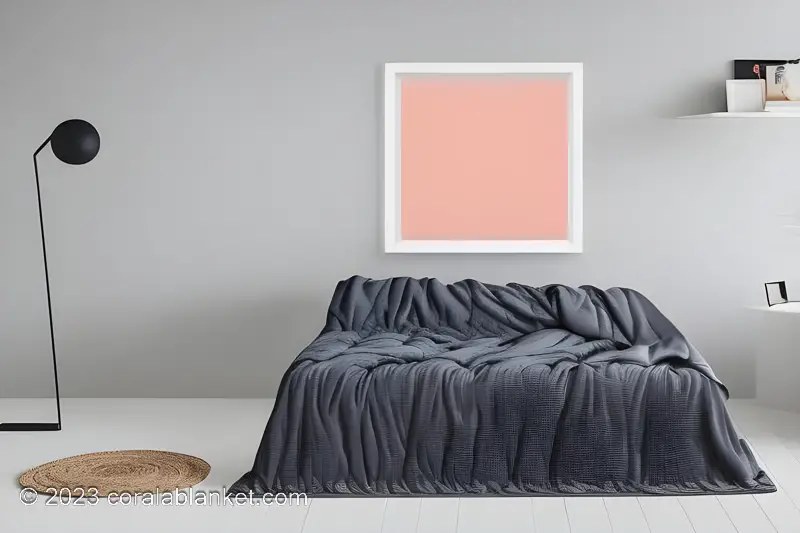Table of Contents
Sleeping with head under covers
We’ve all seen it in the movies. A character is feeling down, so they climb into bed and pull the covers over their head. It’s a visual representation of sadness, depression, or isolation.
But what does it really mean to sleep with a blanket over your head? Is it just a Hollywood trope, or is there some truth to it?
Let’s take a look at what sleeping with a blanket over your head might mean … also from a psychological perspective:
Table of Contents
What does it mean to sleep with a blanket over your head?
Sleeping with a blanket over your head could mean that you are cold and want to keep your head warm while sleeping. It could also mean that you are trying to block out light in your sleeping area so that you can get better sleep. Maybe you only need the feeling of protection and security that comes from cocooning yourself with a blanket.
Although this habit can make you feel comfortable and help you fall asleep faster, it does have some health risks that you should be aware of.
Sleeping with blanket over head meaning psychology
Sleeping with a blanket is an ancient habit, we aresimply used to it. Sleeping with a blanket over your head can mean different things for different people. It may be reminiscent of the womb and provide a sense of safety and comfort. It could also be a way to cope with stress and anxiety, as well as a way to escape from reality and life’s problems.
Whatever the reason, it is important to be aware of the potential health hazards associated with sleeping with a blanket over your head, such as heightened anxiety, claustrophobia, and poor sleep quality.
While a weighted blanket therapy is usually beneficial, people with claustrophobia may not use weighted blanket.

Why Do I Like to Sleep with my Head Under the Covers?
Many people find comfort in sleeping with their head under the covers because it reduces distractions, heightens immunity, provides neck protection and healing, and increases psychological relaxation.
The lack of external stimuli such as light and sound, as well as the sense of security and warmth that the covers provide, make this sleep position ideal for those who are highly sensitive or light sleepers like autistic persons.
The psychological reaction associated with it can be likened to being swaddled as adults, as it reminds us of being in the womb. Although there are some risks associated with sleeping with your head under the covers, such as dulled reactions and oxygen restriction, these can be avoided by taking certain safety precautions.
Benefits of sleeping with a blanket over your head
Block out light and sound
Sleeping with the head under the covers can help with fewer distractions as it blocks light and sound from entering, while also providing a sense of control since the individual is able to create their own environment.
This can be beneficial for highly sensitive people or light sleepers, allowing them to drift off to sleep without being disturbed by their surroundings.
Enhanced Immunity
Sleeping with the head under the covers can bolster the human immune system by reducing the risk of developing an upper respiratory infection, such as the common cold or influenza. This is because the warmer air breathed in helps to prevent the spread of germs and viruses, thus bolstering immunity.
Keeps Head and Neck Warm, Protected
Sleeping with the head under the covers can help protect the neck and aid in healing due to several factors. It can help to reduce pain caused by tissue injuries, muscular strain, and musculoskeletal concerns such as osteoarthritis and rheumatoid arthritis.
It also provides warmth near the neck, which may help reduce cold air-related discomfort. Furthermore, it allows the neck to remain in a natural, comfortable position, promoting proper spinal alignment and cushioning the head.
Psychological Comfort and Security
Sleeping with the head under the covers provides psychological relaxation by creating a sense of safety and calm which may date back to childhood when people would hide from perceived threats.
This practice is similar to swaddling an infant and can trigger a psychological reaction that is reminiscent of being in the womb. This comforting sensation can help to reduce stress and anxiety, improve sleep quality, and relieve symptoms of depression.
Sleeping with the blanket over head is especially good for autistic persons as it gives security and comfort.
Additionally, it may help to increase levels of serotonin and melatonin in the brain, allowing the body to relax and fall asleep. Just like weighted blankets do.

Alternatives to Sleeping with a Blanket over Hour Head
Sleeping eye masks
Sleeping eye masks are a great alternative for those who are sensitive to light. They completely block out any incoming light, making sure your sleep is uninterrupted.
Camping pillows
Camping pillows are another great option as they have special compartments to keep your head inside and block out light. For those who still prefer using a blanket, they can try using pillows to keep their necks elevated and reduce the risk of suffocation.
Just pillows over face
Sleeping with just pillows over the face instead of an actual blanket. This way, they can still reap the benefits of having something warm and comfortable covering up the head without worrying about suffocating or blocking out too much noise.
Weighted blankets
As for the psychological security weighted blankets offer a form of deep pressure stimulation, which has been studied for its potential to reduce symptoms of anxiety.

Research has shown that deep pressure stimulation can help reduce autonomic arousal, which is responsible for physical symptoms of anxiety such as increased heart rate. By providing a sense of security and comfort, sleeping with weighted blankets can help to reduce feelings of anxiety and make it easier to relax and sleep.
Sleeping in small spaces
Many of us feel safer in small spaces. Children, no matter their culture, tend to seek out small places to play in and regard them as a hideaway from the world. We still retain this instinct to burrow, and the feeling of being sheltered in a small, contained space can be incredibly safe.
Side effects of covering head while sleeping
Covering your head while sleeping can lead to a variety of health problems, such as:
- Sleeping disorders such as insomnia
- Respiratory issues including lung damage and suffocation
- Bacterial infections and skin allergies due to dust particles
- Heart problems and brain damage due to prolonged carbon dioxide healing
- Increased heart rate and fatigue due to reduced oxygen
- Reduced outside stimuli, which can be dangerous in emergency situations
- Difficulty in adjusting to sleeping without blankets.
- Increases the occurrence and severity of suffering from dementia or Alzheimer’s diseaseII
Sleeping with blanket over head dementia
Sleeping with a blanket over one’s head can increase the occurrence and severity of suffering from dementia or Alzheimer’s disease. This is because covering the head while sleeping restricts the airflow through the mouth and nose, leading to a decrease in oxygen levels to the brain. When this happens over a prolonged period of time, it can lead to an increase in A-beta proteins, which is a significant marker of Alzheimer’s disease.
In addition, sleeping in a restricted air space can result in episodes of hypoxia, which can also contribute to the development of dementia. Studies have found that sleeping with the head partially or fully covered with bedding can result in dementia later.
Poor sleep is also linked to Alzheimer‘s:
Shokri-Kojori E, Wang GJ, Wiers CE, Demiral SB, Guo M, Kim SW, Lindgren E, Ramirez V, Zehra A, Freeman C, Miller G, Manza P, Srivastava T, De Santi S, Tomasi D, Benveniste H, Volkow ND. β-Amyloid accumulation in the human brain after one night of sleep deprivation. Proc Natl Acad Sci U S A. 2018 Apr 24;115(17):4483-4488. doi: 10.1073/pnas.1721694115. Epub 2018 Apr 9. PMID: 29632177; PMCID: PMC5924922.
FAQ
What are the risks associated with sleeping with a blanket over your head?
The risks associated with sleeping with a blanket over your head include suffocation, low oxygenation, increased risk of sleep paralysis, and increased risk of getting sick.
Suffocation may occur if the blanket covers your face for an extended period of time. Low oxygenation will also wake you up, as the body will sense something is wrong.
People who suffer from sleep paralysis are at higher risk of experiencing episodes while under a blanket.
Why do humans like to be covered at night?
Humans tend to be comforted by the sensation of being covered at night. From a biological perspective, this instinctive desire for protection is rooted in the feeling of being in a secure, air-tight, water-sealed capsule in the womb.
When humans are born, this type of security is no longer available, so they seek to recreate it through the use of blankets or other forms of covering. Blankets activate the somatic sense of pressure that humans feel during gestation, providing a sense of comfort and safety.
Therefore, it is not surprising that humans feel the need to be covered at night as a way of recreating the womb-like environment in which they felt the most secure.
Is it safe to sleep with your head under a blanket?
Arguing yes or no is a difficult task as it depends on an individual’s lifestyle and sleeping habits. Nonetheless, it is possible to sleep with your head under a blanket in a safe manner.
- it is important to keep the blanket loose and use a lightweight cover. This is to ensure that your breathing isn’t restricted
- laying on your back will also reduce the chances of getting wrapped up in the blanket
- keep the area above your head clear to avoid any potential accidents
- It is possible that you may experience a lack of oxygen if you find yourself unable to breathe.
All in all, sleeping with your head under a blanket is not a bad thing as long as it is done safely.
Is it better to sleep with a pillow or a blanket over your head?
When it comes to sleeping with something over your head, there are pros and cons to both using a pillow and a blanket. Pillows are more comfortable and don’t pose the same risk of suffocation as a blanket does. However, a blanket can help keep your head warm and protect your neck from the cold air.
Pillows are typically better for providing support to the head and neck, while a blanket can be used to block out light, if needed. Pillows also have the benefit of being slightly more breathable than a blanket, which can help reduce the risk of suffocation. On the other hand, a blanket can help keep your head warm, which can be beneficial for those living in colder climates.
Why is covering your head while sleeping bad?
Covering your head while sleeping can lead to a variety of issues, such as reducing the quality of your sleep, developing insomnia, and the potential for brain damage. People who sleep with their head covered often find it hard to fall asleep due to feeling sweating and warm, which can keep them awake throughout the night.
Furthermore, this habit can impair breathing patterns, as limited access to air can make it difficult to get a restful sleep. Additionally, covering your head while sleeping can contribute to the causes of brain damage, such as dementia and Alzheimer’s disease, as the restricted airflow to your brain may lead to tissue and vessel damage.
Therefore, it is best to avoid covering your head while sleeping, as it may cause more harm than good.
- 7 Grounding Exercises for Better Sleep Tonight - January 17, 2024
- What Are Grounding's Sleep Benefits? - January 17, 2024
- Maximize Sleep Quality With Seasonal Grounding Strategies - January 17, 2024

